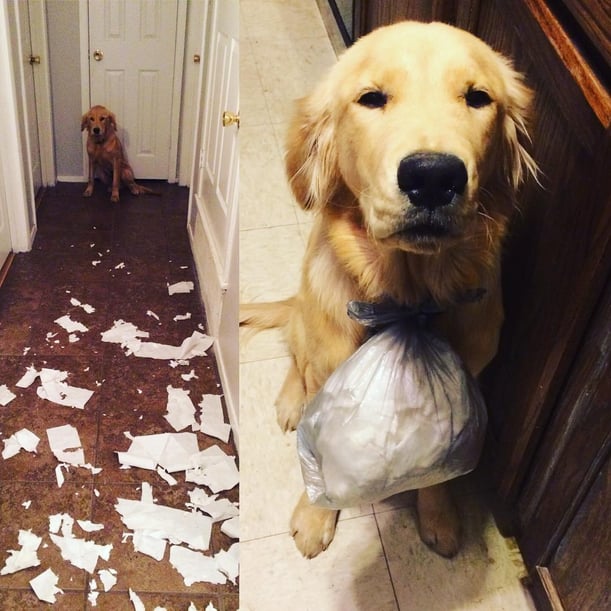It's National Puppy Day! Hopefully you aren't sick of seeing posts from proud puppy owners who believe they own the cutest puppy in the world yet. If you are, and you can't bare to see one more stinkin' picture of a puppy, this is your warning; exit this page now! But, if you can find it within yourself to dull down your frustrations over the content of your news feeds today, I promise to divulge some lead generation strategies I've learned from being a puppy owner; but first, and almost most importantly to this blog, here's my pup, Charlie.
My wife and I got Charlie last April. Like many puppy owners, we were enamored with the idea of having a cute companion that would love us, obey us, and do some awesome tricks. In this initial stage of getting Charlie, we had this grand vision of him personifying only the positive traits of a puppy: cute, playful, loving, and snugly. What was completely blocked out of our minds was reality; and reality hit us almost immediately. Our sleep was dependent on Charlie. Our plans were dependent on Charlie. Our patience was tested by Charlie. Our future parenting skills were brought into question because of Charlie. Our home was Charlie's playground, bathroom, and candy store. Many pee puddles, poop mounds, holes dug, household items chewed up, and night-long whining sessions later, I've gained a perspective about puppy parenthood that relates to lead generation: puppies need nurturing in order to reach the end goal.

*Note: Puppies and leads are not synonymous. Don't actually treat and talk to leads like puppies; that will, surely, be detrimental to your goals.
4 Ways Puppy Parenthood and Lead Generation Relate to Each Other
1. You nurture
When you first get a puppy, you don't expect them to be fully trained, mature adults. It takes time and nurturing to get them there. Disappointment isn't a great way to begin a relationship with your new companion, and that's what will linger in your mind when you expect them to be who you want them to be from the beginning. Instead, you have to nurture them. You have to encourage them throughout their puppy years so they continue to progress toward the end goal.
.png?width=611&height=611&name=Untitled%20design%20(25).png)
Prospects go through a similar journey. They begin with a problem they are trying to solve and do the necessary research in order to define their problem. Your business needs to be there during this awareness stage. If you catch them here, you can nurture them toward the consideration stage, where they are researching ways to solve the problem they defined. Your business also needs to be there during this stage. If you continue nurturing them, your work will culminate with nurturing that stranger with a problem to a customer.
2. You offer something desirable for a little return
Charlie loves treats, and dog food, and human food, and, basically, anything he can get into his mouth. One of the most popular puppy training strategies is reinforcing good behavior with a reward, whether it be a treat, a high-pitched "good boy," or a nice belly rub. You give your puppy something they want and they take a step closer to where you want them to be in their training journey.

If you aren't offering prospects anything, you probably won't get anything in return. Informative ebooks, checklists, whitepapers, etcetera, are all content offers people tend to desire as they're on their buyer's journey. What you get in return is valuable information that you can use to nurture them further down the sales funnel.
For more on how to create a content offer that converts, check out these 7 irresistible content offer elements that attract online sales leads.
3. It's not all about you from the get-go
Your brand new puppy doesn't know, nor really cares, who you are when you first get him or her. As long as they have food, they're good. They have a problem; the person who used to feed them is no longer present and they're hungry. They aren't going to be fans of their new home until you solve the problem happening in their empty stomach.
If your marketing strategy involves merely talking about your business, you're going to miss those strangers searching for a name for their problem, and a solution to that problem.
4. You listen
Charlie is smart enough to let us know when it's breakfast time and dinner time. If we didn't listen to his promptings, he would not be a happy camper. He'd be mouthy and we'd be frustrated that he's mouthy. What solves this potential chaos that happens around meal time? Listening. Charlie prompts us. We listen to Charlie. We feed Charlie. Charlie's happy. Threat of chaos? Resolved.
Your audience is going to have something to say. To make them feel like they're valued, you have to listen to what they're saying, whether it's positive or negative, and respond accordingly.For more on how to listen and respond to prospects, you can download this FREE ebook!
So next time you're creating a lead generation strategy, make sure to remember your cute companion at home. Think back to your journey training him or her to become what they are today and utilize some of those same strategies.
Happy National Puppy Day!
For more tips on how to begin generating leads, download this free ebook! In it, you'll find 30 of the greatest lead generation tips, tricks, and ideas!




